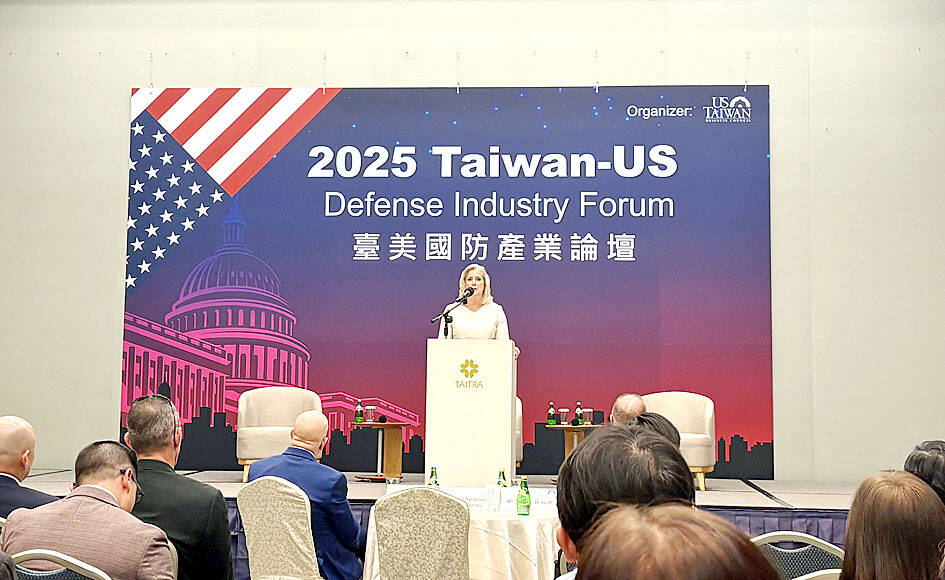Taiwan’s pledge to increase defense spending to 3 percent of GDP demonstrates its seriousness about self-defense, former US secretary of the army Christine Wormuth told the Taiwan-US Defense Industry Forum in Taipei yesterday.
Wormuth, who served as secretary of the army from 2021 to early this year under former US president Joe Biden also praised the government for adopting a whole-of-society approach to self-defense.
The decisions are “substantial and significant,” and send an important message to Washington about “the seriousness with which the government here takes its responsibility to do what needs to be done,” she said.

Photo: CNA
The Cabinet this year earmarked NT$647 billion (US$21.62 billion) for defense spending, or 2.45 percent of GDP.
However, part of the budget was cut or frozen by the legislature.
President William Lai (賴清德) later pledged to propose a special budget to raise defense spending to more than 3 percent of GDP, although the plan would still require legislative approval.
Lai’s pledge came against the backdrop of US President Donald Trump raising questions about his support for Taiwan, having said on the campaign trail that Taiwan “stole our chip business” and needed to “pay us for defense.”
He has also suggested that Taiwan should pay the US for protection and proposed that it increase its defense spending to 10 percent of GDP.
Before becoming the first female US secretary of the army, Wormuth had decades of experience working in the US Department of Defense.
In her address yesterday, she said that while working in Washington for decades, she witnessed firsthand the strong consensus — shared by Democrats and Republicans — on the challenges posed by China, “not just for Taiwan, but for the entire Indo-Pacific region.”
However, over the past 20 years, the US military has been “extremely preoccupied” with events in the Middle East, during which time China modernized its military and engaged in coercive behavior in the Indo-Pacific region, including frequently sending warships and warplanes into Taiwan’s air defense identification zone, she said.
The most important task for Taipei and Washington is to do everything possible to boost their deterrence posture “so that on any given day, President Xi [Jinping, 習近平] and the Chinese leadership will wake up knowing today is not the day that we want to try to change the status quo,” she added.
The Taiwan-US Defense Industry Forum was cohosted by the US-Taiwan Business Council, a nonprofit organization founded in 1976 to promote trade relations between the two countries, with a special focus on the defense sector.
Other speakers included Chris Decker, president of Virginia-based Planate Management Group, which has done extensive work for the department of defense; and Stayne Hoff, Asia-Pacific business development director at Puerto Rico-based firm Red Cat Holdings, which provides products, services and solutions to the drone industry.
The event was hosted by US-Taiwan Business Council president Rupert Hammond-Chambers.
The event aimed to explore the potential for Taiwan-US coproduction and partnerships in drones and uncrewed vehicles, the council said.

MAKING WAVES: China’s maritime militia could become a nontraditional threat in war, clogging up shipping lanes to prevent US or Japanese intervention, a report said About 1,900 Chinese ships flying flags of convenience and fishing vessels that participated in China’s military exercises around Taiwan last month and in January have been listed for monitoring, Coast Guard Administration (CGA) Deputy Director-General Hsieh Ching-chin (謝慶欽) said yesterday. Following amendments to the Commercial Port Act (商港法) and the Law of Ships (船舶法) last month, the CGA can designate possible berthing areas or deny ports of call for vessels suspected of loitering around areas where undersea cables can be accessed, Oceans Affairs Council Minister Kuan Bi-ling (管碧玲) said. The list of suspected ships, originally 300, had risen to about 1,900 as

Japan’s strategic alliance with the US would collapse if Tokyo were to turn away from a conflict in Taiwan, Japanese Prime Minister Sanae Takaichi said yesterday, but distanced herself from previous comments that suggested a possible military response in such an event. Takaichi expressed her latest views on a nationally broadcast TV program late on Monday, where an opposition party leader criticized her for igniting tensions with China with the earlier remarks. Ties between Japan and China have sunk to the worst level in years after Takaichi said in November that a hypothetical Chinese attack on Taiwan could bring about a Japanese

MORE RESPONSIBILITY: Draftees would be expected to fight alongside professional soldiers, likely requiring the transformation of some training brigades into combat units The armed forces are to start incorporating new conscripts into combined arms brigades this year to enhance combat readiness, the Executive Yuan’s latest policy report said. The new policy would affect Taiwanese men entering the military for their compulsory service, which was extended to one year under reforms by then-president Tsai Ing-wen (蔡英文) in 2022. The conscripts would be trained to operate machine guns, uncrewed aerial vehicles, anti-tank guided missile launchers and Stinger air defense systems, the report said, adding that the basic training would be lengthened to eight weeks. After basic training, conscripts would be sorted into infantry battalions that would take

DEEP-STRIKE CAPABILITY: The scenario simulated a PLA drill that turned into an assault on Taiwan’s critical infrastructure, with the launchers providing fire support Taiwan yesterday conducted this year’s first military exercises at Longsiang Base in Taichung, demonstrating the newly acquired High Mobility Artillery Rocket System’s (HIMARS) ability to provide fire support and deep-strike capabilities. The scenario simulated an attack on Penghu County, with HIMARS trucks immediately rolling into designated launch areas and firing barrages at the Wangan (望安) and Cimei (七美) islands, simulating the provision of fire support against invading forces. The HIMARS are supposed to “fire and leave,” which would significantly increase personnel and equipment survivability, a military official said. The drill simulated an exercise launched by the Chinese People’s Liberation Army (PLA) Eastern